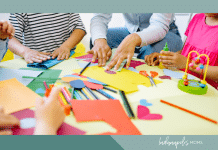“Within the child lies the fate of the future.” -Dr. Maria Montessori
Like many parents of pandemic babies and toddlers, my husband and I struggled with the decision to send our fragile, 3-month-old firstborn to daycare in March 2020. We weren’t in a financial space for me to easily stay home, and truthfully, I wasn’t in the right mental space to stay home. I knew the PPD/PPA fog would take even longer to clear if I had no contact with the world outside our home. Unfortunately, like many other parents of daycare children at the time, our children’s home away from home experienced a high amount of staff turnover in the two years following the rise of Covid. This led to us feeling uninformed, disconnected, and hesitant even still 1.5 years later when it was time to send our second child to the same facility. Finally, after being on a waitlist for well over one year, a spot opened at our local Montessori preschool, and we jumped at the opportunity to send both of our children.
Montessori education was not something my husband and I were familiar with at all until becoming parents (thank you, Instagram scrolling!). We were intrigued by the promise of our toddlers spending more time learning outdoors versus sitting in a classroom completing piles of worksheets. The notion of obtaining practical life skills along the way was an added benefit in our minds, as well. After being at their Montessori preschool for one year now, we are thrilled with what our children have learned and what we have learned as parents, too.
Traditional learning milestones will come with time. It’s hard not to want your child to master concepts like letter recognition and reading as quickly as possible, but we have learned that sometimes, a non-traditional approach is exactly what children need. Our four-year-old daughter is currently building words and sentences without knowing every letter of the alphabet. Her lessons have focused on sounding out words, and recently, she has been telling us the sounds of each letter in words that she sees. Our four-year-old’s teacher worked with her to spell the sentence, “Dear Mom, thank you for writing your favorite flower.” Did she do it perfectly? Of course not, but we can see how her brain is thinking through the sounds and learning to form words.

Toddlers can have chores (and can be very helpful)! Not only are our toddlers capable of more than we may realize, but often, they also truly want to help. Having responsibilities within their school and home has given our children a sense of pride and importance. At their Montessori school, they help weed, plant, and tend to their community garden. They also learn to prepare their own snacks, clean everything (from floors to windows to laundry), and present lessons to other friends. At home, we have implemented chores like washing the dining table, loading and unloading the dishwasher, and gathering ingredients for meals they have chosen. For example, our children are currently obsessed with making acai bowls, which require many ingredients from the pantry, freezer, and refrigerator. Our 2.5 and 4-year-olds gather every single item independently, making less work for us!

You do not need to create a picture-perfect Montessori home for your children to reap the benefits of what they are learning at school. While my husband and I certainly adapted some practices that we learned from our children’s Montessori preschool and through online research, we also do not have a home that looks like what you’d find on Instagram or Pinterest when you search “Montessori home.” We have created spaces where our children have less clutter (removing the over-abundance of over-stimulating toys piled onto small shelves) and more independence (having a cabinet of snacks they can safely select and prepare independently). They can also reach and select their clothes and shoes in the morning. These were easy steps for us to take in our own home that have given our children some sense of continuity with their independence and responsibility at school and home.
Upon speaking with other parents, educators, and healthcare professionals, our family has learned a great deal about the benefits of a Montessori education approach for preschoolers. The most important fact we have learned is that no children or families are exactly the same, meaning everyone can choose their own path, and everything will turn out perfectly fine. Basically, you do you, Mamas! But if you are hesitant about how your children spend their time at daycare or preschool, perhaps a Montessori preschool is something you could consider.








